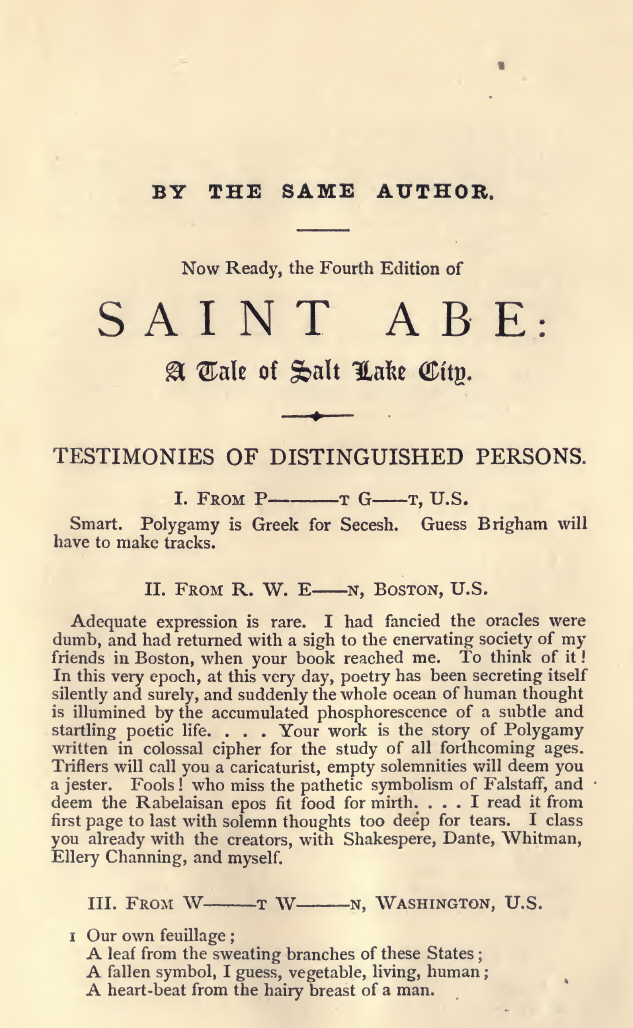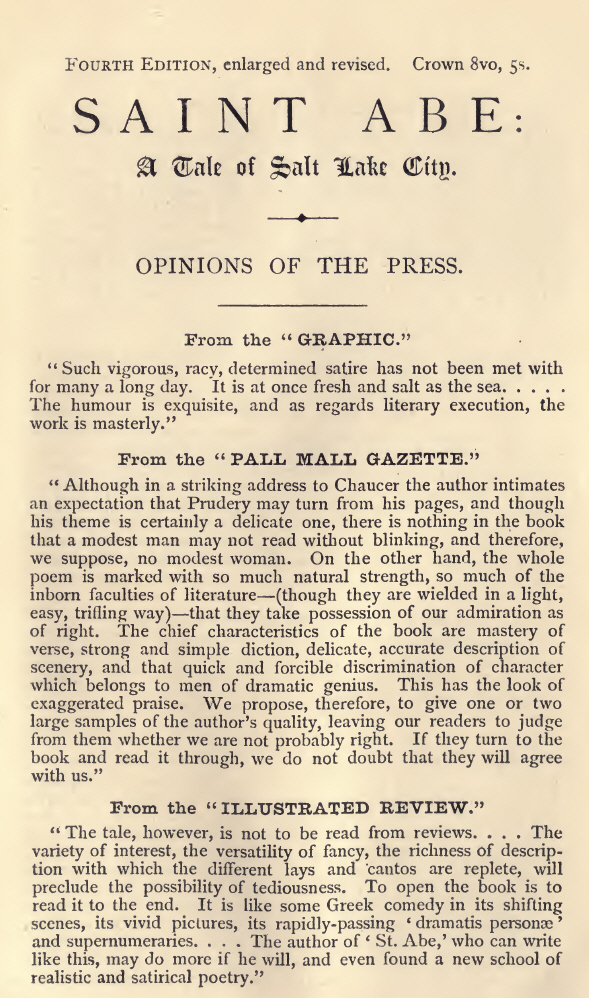ROBERT WILLIAMS BUCHANAN (1841 - 1901)
|
ROBERT WILLIAMS BUCHANAN (1841 - 1901) |
|
|
|
|
|
|
|
|
{White Rose and Red 1873}
192 THE JOURNEY’S END. BACK in a swoon, with haggard face, The clock ticks low within. Without “O what can keep Eureka still?” [He hurries not! Perchance some sense “What can she be?” thinks little Phœbe, E’en as she spake the stranger stirr’d. The cold lips trembled with no word. Now courage, Phœbe! steel thy spirit! Slowly, so vilely it is writ, “E-U-R-E”—in letters blurr’d 199 “EUREKA HART, DROWSIETOWN, STATE OF MAINE.” First lightning flash of fierce surprise! Ay, little wife!—and these dim stains The woman took her hand. She shook A hand upon the latch. Both start,—
[Notes:
202 FACE TO FACE. WARMLY muffled to the chin there, Round her face the black hair raining, Phœbe screams. Stagger’d and blinded, Her white Chief, whom God had brought her Her white Warrior, her fair Master! Yes, her eyes are blindly gleaming No, she will not see the horror Suddenly the rapture falters, Tiny, pink-cheek’d, blushing brightly, Still stands little Phœbe, panting, Suddenly, with acclamation, Peace, O Winds, your weary voices Spare her! Who would bid him spare her? Phœbe shivers. To her reaching,
[Notes:
215 [note] PAUGUK. O POOR Red Rose! rent by the storm! Moveless she lay; but in her breast They raised her up, and, with soft tread, And little Phœbe’s heart did ache, And little Phœbe’s own kind hands Took softly off the dripping dress, 216 Wrung the wet hair, and smoothed it right, There, all in white, on a white bed, Around her was a roar, a gleam, Faces round her went and came, For all the time, fever’d and sore, Once again her Soul’s feet trod Once again she sail’d along 217 Once again, with weary tread, Once again she falter’d slow Oh, the roaring in her brain! Against her, as she clasps her child, She sees a light that shines afar; She hears a voice afar away; Around her clouds of tempest roll, 218 But now and then, amid the snow, And white she lies, in a white room, Close by the bed where she doth rest, A little woman, waiting there, E’en as she wakens, wild and weak, And reaching out, with a thin moan, But swoons once more, and hears again 219 Now as she dreams, with fever’d cries, And Phœbe and her maidens go Down-stairs by the great fire of wood, And when his little wife descends She scarcely looks into his face, And at her will he flies full meek, Her eyes are swoll’n with tears; to him 220 But as she reascends the stairs In pity half, and half in scorn, She cannot love her; yet her heart Her thoughts are angry, weak and wild, Often she prays, with heart astir, And thus, despite her heart’s distress, Silent for days by that bedside 221 Not all alone; by her unseen, He squatteth in the corner there, Clad in fantastic Indian weeds, Gaunt, haggard, hungry, woebegone, For wintry Peboan hath fled, And there he waits, unseen, unheard; Fixeth his glittering gaze, Pauguk
222 THE MELTING OF THE SNOW. A SOUND of streamlets flowing, flowing; Underneath her death-shroud thick, In the farmhouse (where a light Thus she did her duty there, Screen’d thus from the wintry blast, Here and there upon the plain, A sound of waters ever flowing; 229 Not alone! ah! not alone! Waking up with fever’d moan, ’Twas at sunset; on the bed Pale, affrighted, and aghast, The sun was set, the night was growing,
232 THE LAST LOOK. TO the bedside, white and quaking, Silent Spirits, shapes that love her, See! her hand points upward, slowly,
237
239 EPILOGUE. IN a dark corner of the burial-place, Sleeping, or waking? There, with eyes tear-wet, Here ends my tale; what further should I state? As for Eureka, why, he felt, of course,
243
P. 209. The Printer’s Devil queries this, but he does not know the Old Poets. See (e.g.) Michael Drayton’s “Moses’ Birth and Miracles”—“And spreans the pretty hands.” [back] P. 213. See the American-Indian Mythology. “Peboan” is the personification of extreme Cold. [back] P. 215. In the same mythology, Pauguk is, as represented in the poem, the Indian spirit of DEATH. [back]
_____________________________________
|
 |
|
[Note: This page is followed by the rest of the Testimonies as reprinted in the 1896 edition of St. Abe and His Seven Wives, available here.] |
 |
|
[Note: This page is followed by the rest of the Press Opinions as reprinted in the 1896 edition of St. Abe and His Seven Wives, available here.] _____
Back to White Rose and Red - Contents or Poetry
|
|
|
|
|
|
|